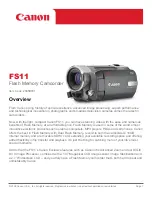
144
VQT1Y00
Others
Cautions for use
The unit and the SD card become warm during
use. This is not a malfunction.
Keep the High Definition Video Camera as far
away as possible from electromagnetic
equipment (such as microwave ovens, TVs,
video games etc.).
≥
If you use the High Definition Video Camera on
top of or near a TV, the pictures and sound on
the High Definition Video Camera may be
disrupted by electromagnetic wave radiation.
≥
Do not use the High Definition Video Camera
near cell phones because doing so may result
in noise adversely affecting the pictures and
sound.
≥
Recorded data may be damaged, or pictures
may be distorted, by strong magnetic fields
created by speakers or large motors.
≥
Electromagnetic wave radiation generated by
microprocessors may adversely affect the High
Definition Video Camera, disturbing the
pictures and sound.
≥
If the High Definition Video Camera is
adversely affected by electromagnetic
equipment and stops functioning properly, turn
the High Definition Video Camera off and
remove the battery or disconnect AC adaptor.
Then reinsert the battery or reconnect AC
adaptor and turn the High Definition Video
Camera on.
Do not use the High Definition Video Camera
near radio transmitters or high-voltage lines.
≥
If you record near radio transmitters or
high-voltage lines, the recorded pictures and
sound may be adversely affected.
Make sure to use the supplied cords and
cables. If you use optional accessories, use
the cords and the cables supplied with them.
Do not extend the cords and the cables.
Do not spray insecticides or volatile
chemicals onto the unit.
≥
If the unit is sprayed with such chemicals, its
body may be marred and the surface finish
may peel off.
≥
Do not leave rubber or plastic products in
contact with the unit for a long time.
When you use the unit in a sandy or dusty
place such as a beach, do not let sand or fine
dust get into the body and terminals of the
unit.
Also, keep the unit away from sea water.
≥
Sand or dust may damage the unit. (Care
should be taken when inserting and removing
a card.)
≥
If sea water splashes onto the unit, wipe off the
water with a well wrung cloth. Then wipe the
unit again with a dry cloth.
When carrying the unit, do not drop or bump
it.
≥
A strong impact can break the unit’s casing,
causing it to malfunction.
Cleaning
≥
Before cleaning, detach the battery or pull the
AC cable from the AC outlet, and then wipe the
unit with a soft, dry cloth.
≥
If the unit is very dirty, dip a cloth in water and
squeeze firmly, and then wipe the unit with the
damp cloth. Next, dry the unit with a dry cloth.
≥
Use of benzine, paint thinner, alcohol, or
dishwashing liquid may alter the camera body
or peel the surface finish. Do not use these
solvents.
≥
When using a chemical dust cloth, follow the
instructions that came with the cloth.
Do not use the unit for surveillance purposes
or other business uses.
≥
This unit was designed for consumer
intermittent use. It was not intended for
continuous use, or for any industrial or
commercial application resulting in prolonged
use.
≥
In certain situations, continuous use could
cause the unit to overheat and cause a
malfunction. Such use is strongly discouraged.
When you are not going to use the unit for an
extended time
≥
When storing the unit in a cupboard or cabinet,
it is recommended that you place a desiccant
(silica gel) in with it.
About this unit
HDCSD20&SD25&HS20P-VQT1Y00_eng.book 144 ページ 2008年12月22日 月曜日 午後8時16分
















































